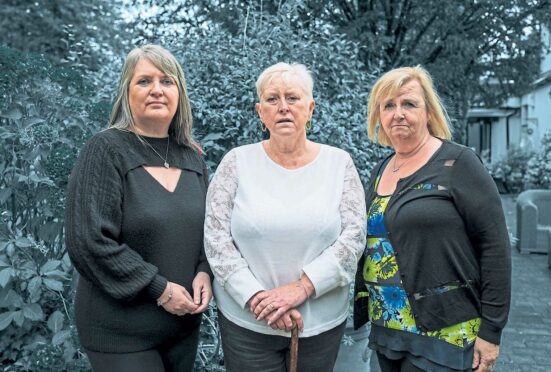
The author of an independent review of how ministers investigated the risks of mesh has voiced frustration that none of its 46 recommendations have been put in place four years on.
Alison Britton, a professor of healthcare and medical law at Glasgow Caledonian University, was commissioned to report on how the Scottish Government’s inquiry into mesh implants was undertaken after it ended in acrimony as patients branded it a whitewash. This followed The Post revealing that all four clinical experts on the 20-strong inquiry, plus three other members, had links to mesh manufacturers.
Britton’s year-long study concluded the review was ill-conceived and poorly executed and made 46 recommendations that may be applied to other reviews in future. They included setting up a unit to support commissioned reviews, and the application of a test of impartiality to allow a review group member’s prior knowledge or involvement in a subject to be disclosed and evaluated.
But four years later, not a single one has been adopted by the Scottish Government.
Britton said: “Our recommendations were published in October 2018. They were comprehensive, well received, covering a range of matters of including competence of the chair, the independence and impartiality of the members, the scope of its terms of reference, its timescales and budget.
“An independent review relies on the goodwill, emotional resources, courage, insights and expertise of the people who engage in its process. It is disappointing therefore, that, to date, none of our recommendations have been adopted by the Scottish Government.”
Britton said public interest issues should have encouraged the adoption of her recommendations.
She said: “A review usually arises from unanswered questions, controversy or public interest and can vary in terms of gravity and urgency. But the key words here are controversy and public interest. I aimed to provide a framework within which future reviews could be conducted in an open, transparent and accountable manner.
“The very nature of a review brings together a range of people with significant and often very diverse interests.
“Because of this, any review’s purpose and proposed outcomes must be clear so that all of those participating understand what is expected of them. Importantly the review should also understand and address public expectations. The subject of a review is usually highly charged and often harrowing both for those participating and for those awaiting the review’s conclusions.”
Britton said during her investigation she saw firsthand how frustration, anger and deep sadness can take a devastating toll on those taking part.
She said: “For many, it takes a lot of courage and emotional resources to engage in a review process and I believe that it is the responsibility of the chair of the review to make sure that their report reflects such contributions.
“However, the chair can only do so much and we rely on other stakeholders, including the commissioning government minister, to share the responsibility to ensure that such engagement is not in vain.
“Commissioning a review raises hopes and expectations that answers will be given to questions that have long been unresolved and unanswered.
“If this is not the case then this can have a detrimental impact not only in the sense of a loss of faith in the review process, but a personal and keenly felt despair for lack of resolution for those being left with no sense of ‘closure’ and opportunity to move on with their lives as best they can.
“Although our remit was to investigate the Scottish independent review of mesh implants, our recommendations were made with the intention that they could be applied to any subsequent non-statutory independent review.”
The mesh review debacle led to the government’s own appointed mesh expert Dr Wael Agur resigning from the inquiry, following in the footsteps of Scottish Mesh Survivors Elaine Holmes and OIive McIlroy.
The women said their three years of hard work and effort into the 2017 review was wasted after a whole chapter of concerns and factual data about adverse effects caused mesh used on thousands of women had either been “excluded completely or diluted beyond recognition” from the official report.
When she published her report, Britton described the original mesh inquiry as “ill-conceived, thoughtlessly structured and poorly executed”.
She criticised the failure of members to declare potential conflicts of interest, with some being paid to conduct research in the area they were investigating.
And she warned that most members of the review were totally unprepared for the level of public and political scrutiny they received.
Britton said that while she was satisfied that nobody involved in the original inquiry had acted in bad faith, it had ultimately failed due to a lack of oversight and proper guidance.
She said at the time: “Our investigation identified a number of problems with how the mesh review solicited, monitored and reported relevant declarations and conflicts of interests by members of the review group.”
Among the recommendations was that the importance of transparency and accountability in the completion of declaration of interest should be explained.
Britton also recommended potential appointees should have no perceived conflict of interest which may raise doubts on independence, and that the chairperson should be involved in the selection process of potential review members.
The Scottish Government said: “The Scottish Government welcomed the vast majority of Professor Britton’s recommendations and they are reflected in a number of reviews and inquiries which have subsequently taken place. Guidance to assist the public inquiry process is being developed by the Scottish Government and will be published in parliament.
“The guidance will benefit from professor Britton’s work as well as from the experience of a number of inquiries currently in progress.”

Enjoy the convenience of having The Sunday Post delivered as a digital ePaper straight to your smartphone, tablet or computer.
Subscribe for only £5.49 a month and enjoy all the benefits of the printed paper as a digital replica.
Subscribe





